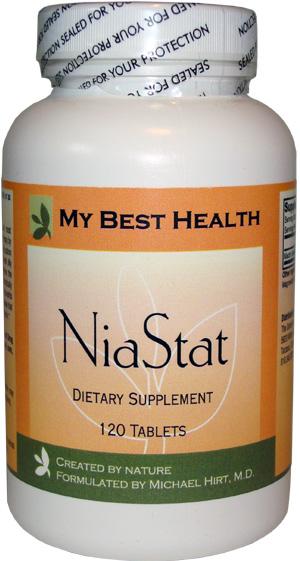Power of Niacin Without Side Effects
- Lowers triglycerides
- Increases HDL
- Lowers Lipoprotein
- Reduces niacin side effects
- Reduces chances of skin flushing
Years of clinical research has proven the effectiveness of vitamin B3, niacin, in the treatment of high cholesterol. Niacin is particularly effective at lowering triglycerides, increasing HDL, and lowering Lipoprotein (a), one of the most dangerous types of cholesterol.
Triglycerides are a type of fat found in the blood that comes mainly from foods you eat (or drink) such as carbohydrates (sugar, honey, grains [wheat, rice, oats, barley, rye, quinoa, spelt, amaranth, kamut], foods made from grains [such as pasta, crackers, bakery goods, cereals], fruit, fruit juices) and alcohol. Like cholesterol, triglycerides can contribute to clogging of your arteries and organs when their blood levels get too high. If your cholesterol blood test shows a high level of triglycerides, you should reduce the amount and frequency of these carbohydrates in your diet. Using supplemental niacin can help to substantially reduce dangerously high triglycerides in the blood.
HDL is the ―Healthy cholesterol and helps to clean and clear clogged arteries. Having a low HDL is worse than having a high LDL (―Lousy‖) cholesterol. Raising the HDL can be done by exercising (at least one hour daily of vigorous cardio-style exercise) and by taking niacin supplements. Prescription cholesterol-lowering drugs, like statins, can only increase HDL slightly and insufficiently.
Lipoprotein(a) is a hook-like protein that sticks out of the cholesterol fat molecule in the blood. The Lipoprotein(a) hook easily catches on the inside of the arteries, allowing the attached cholesterol molecule to get inside the artery walls and contribute to a blockage of the artery. When Lipoprotein(a) levels are high and untreated, the risk for having and premature heart attack or stroke can be very high. Unfortunately, cholesterol reducing prescription drugs have no effect on Lipoprotein(a) levels and provide no protection from its deadly effects.
The problem with using niacin has always been ―flushing, an uncomfortable (but harmless) red, itchy skin condition that lasts a few minutes to a few hours. There are ―No Flush niacin vitamins available over-the-counter but many of these can cause liver damage or are made of niacin-like molecules that are not effective at helping cholesterol test results.
NiaStat has been developed for maximal effectiveness and minimal side effects. NiaStat is made with a special, patented technology that mixes niacin with a special type of wax that lets the niacin slowly and steadily get into your system over eight hours. This reduces any side effects on the liver and reduces any chances of skin flushing.
To further reduce the chances of flushing, take an aspirin (baby [81mg] or regular [325mg]) one hour before taking NiaStat and take Niastat with dinner or with a low-fat, healthy snack at bedtime. When taken this way, any flushing that may occur should happen while you peacefully sleep.

